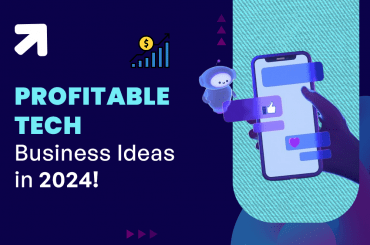In today’s rapidly changing world, businesses should adopt digital transformation to remain competitive. Digital transformation involves using technology to improve business operations and deliver better results.
With so much competition for clients, it’s important to embrace digital transformation to enhance your market presence. This blog will explore the concept of digital transformation and provide insights into how businesses can stay ahead in a rapidly evolving market.
If you are seeking a marketing agency to assist with your digital transformation, consider Fluper as an option.
About Digital Transformation
Digital transformation is the complete use of digital technology in every aspect of a company, fundamentally changing how it operates and delivers value to consumers. It involves using cutting-edge technologies like blockchain, cloud computing, artificial intelligence (AI), and the Internet of Things (IoT) to improve customer experiences, streamline operations, and boost the growth of new business models.
In essence, digital transformation needs reevaluating strategies and processes while modernising technology. Organizations embrace experimentation, continuously challenge the status quo, and recognize failure as an essential part of progress. This necessitates a cultural shift.
The goal is to use digital tools to enable more efficient workflows, enhance data-driven decision-making, and deliver seamless, personalized experiences.
Technological Advancements
- The Role of Emerging Technologies
Advanced technologies like AI, blockchain, and cloud computing have a significant role in digital transformation. Each technology offers different benefits – AI can automate routine tasks, provide analytics, and improve customer experience. Blockchain ensures secure transactions, while cloud computing gives storage solutions.
- How These Technologies Can Streamline Operations and Improve Customer Experiences
These technologies allow you to do real-time data analysis, diminish errors, and expedite all repetitious activities. Through the provision of individualised solutions and quicker replies, these cutting-edge technologies also enhance the client experience.
Fluper is the best agency to work with if you want to use these technologies for your benefit. Their staff of skilled experts knows how and when to use cutting-edge technology to provide your clients with a seamless and customised experience.
Strategic Implementation
- Steps for Successful Digital Transformation
A plan is needed to make your digital transformation succeed. To begin, evaluate your digital skills and pinpoint areas that require improvement. Make a plan which includes the objectives, due dates, and required materials. Make sure the executive team approves and provides enough funding for the project.
- Importance of Aligning Digital Initiatives with Business Goals
Ensuring that digital initiatives with business goals guarantee that transformation efforts are targeted and yield quantifiable results. Projects with the biggest effects on the business and customer satisfaction are prioritised thanks to this alignment.
- Case Studies of Successful Digital Transformations
Case studies give you inside information on how other companies have handled digital transformation with success. For example, Fluper, a top provider of IT services, has used cutting-edge mobile app solutions to improve client experiences and expedite processes for several organisations.
Change Management
- Addressing the Human Side of Digital Transformation
Digital transformation involves people as much as technology. Effectively managing change, outlining the advantages of transformation, and including staff members in the process are all part of addressing the human side of change.
- Training and Upskilling Employees for New Digital Tools and Processes
Employees must have access to training and upskilling opportunities to adjust to new digital tools and procedures. By doing this, it is ensured that the staff can use the latest technology with confidence and competence.
- Cultivating a Culture of Innovation and Agility
Fostering a culture that values creativity and adaptability motivates staff members to welcome change and always look for methods to do better. This culture helps companies stay ahead in a market that is changing quickly and encourages continuous digital transformation.
Customer-Centric Approach
- Leveraging Data Analytics for Better Customer Insights
Deep insights into the needs, tastes, and behaviours of customers are provided by data analytics. Companies can utilise these insights to customise their offerings to match consumer expectations for goods, services, and marketing plans.
- Enhancing Customer Experiences Through Personalized Digital Interactions
Personalised digital interactions improve customer experiences and foster loyalty. Examples include tailored advice and focused marketing. Businesses can provide more relevant and engaging experiences by utilising AI and data.
- Building a Seamless Omni-Channel Customer Journey
A consistent and integrated customer experience over all touchpoints is guaranteed by a smooth omnichannel customer journey. This entails maintaining seamless transitions between online and offline channels while synchronising them.
Measuring Success
- Key Performance Indicators (KPIs) for Digital Transformation
KPIs that assess the effectiveness of digital transformation programs include revenue growth, operational efficiency, and customer happiness. These metrics give a vivid picture of the results of transformation initiatives.
- Tools and Metrics to Track Progress and ROI
Progress and ROI are monitored using several tools and KPIs, including performance dashboards and analytics platforms. These tools assist companies in making data-driven decisions and tracking the success of their digital transformation initiatives.
Challenges and Solutions
- Common Obstacles in Digital Transformation Efforts
Typical roadblocks include inadequate funding, a lack of digital skills, and aversion to change. Strong leadership, clear communication, and a calculated approach to resource allocation are necessary to meet these problems.
- Strategies to Overcome Resistance and Ensure Smooth Implementation
Employee participation in the change process, sufficient training, and benefit communication are all necessary to overcome opposition. Ensuring efficient execution by establishing reasonable objectives, keeping track of results, and modifying tactics.
Engaging and Valuable Insights
- Expert Interviews and Opinions
Leaders in the field offer insightful commentary on best practices and trends in digital transformation. Professionals with knowledge can impart their insights and provide helpful guidance on managing the transition process.
- Interactive Elements
Engaging material is enhanced with interactive components like infographics, movies, and real-world examples that demonstrate essential ideas. These components aid in illustrating the effects of the digital transition.
- Actionable Takeaways
Giving readers concrete recommendations and doable actions they can do right away will guarantee that they can apply the knowledge they have received to their digital transformation initiatives.
Conclusion
Businesses must embrace digital transformation, to remain competitive in a market that is changing quickly. Businesses can improve operations and provide better customer experiences by utilising emerging technology, coordinating digital activities with corporate objectives, and emphasising the human side of transformation.
As a leading provider of IT services, Fluper provides creative solutions to assist companies in effectively navigating this journey. Take advantage of the digital revolution to set up your company for long-term success.











